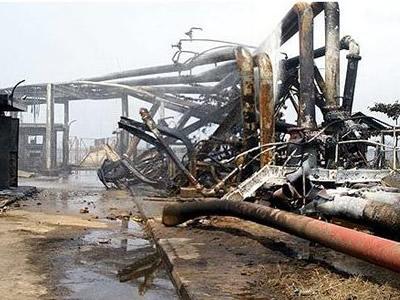A lecturer at the University of Lagos (UNILAG), Imoize Agbotiname has said that Nigeria lost over N174billion to pipeline vandalism in 10 years.
Speaking at the OTL Africa Downstream Week on Tuesday on a topic tagged ‘NNPC Pipeline Vandalisation – Securing Gas Pipelines against Vandalisation’, Imoize said numerous deaths have also been recorded from pipeline explosions in the country.
According to him, efforts to eliminate pipeline vandalisation by employing solutions such as burying the pipelines deeper into the ground had yielded no positive result.
He however encourages the use of Distributed Sensing (DTS) as a means of securing the pipeline against vandalisation.
His words, “DTS enables real-time measurement, very effective and can detect leaks to a precision of 1 meter.”
Imoize who is a lecturer in the department of Electrical & Electronics Engineering UNILAG said the software is a cheaper way of protecting the pipelines.
Meanwhile, Managing Director, Rain Oil Limited, Gabriel Ogbechie has identified poor maintenance of infrastructural facilities as part of the challenges bedeviling the growth of the sector.
Ogbechie said the near absence of rail service network across the country had hampered the growth of the sector.
He said, “The poor state of roads makes the movement of products from the various depots to the retail outlets difficult. This is compounded with the near absence of rail service networks across the country as well as the ineffective functionality of our inland water ways,”
Ogbechie further stated that vandalism and sabotage are other major challenges that must be looked into by the present administration.
“Certain activities such as pipeline vandalism, arson, smuggling of petroleum products among others are major challenges facing the downstream oil sector.
The MD however proffered way out of the above stated challenges asking the government to invest in local storage infrastructure.
His words, “Investment in local infrastructure will cut costs and improve the efficiency of product distribution. Such investment could include construction of ports with deep vessel draught or single buoy moorings (SBMs), which allow efficient berthing of larger vessels, dredging of existing ports to allow the discharge of larger vessels and construction of underground pipeline systems to minimise theft and vandalism.
“Also, there should be improved storage infrastructure. This is important to ensure sufficient buffer to mitigate disruption in the supply. Storage facilities have a significantly shorter turnaround compared to refineries. Hence, would be a more efficient option to take advantage of the reduced global oil price regime.”
Copyright Ships & Ports Ltd. Permission to use quotations from this article is granted subject to appropriate credit given to www.shipsandports.com.ng as the source.

